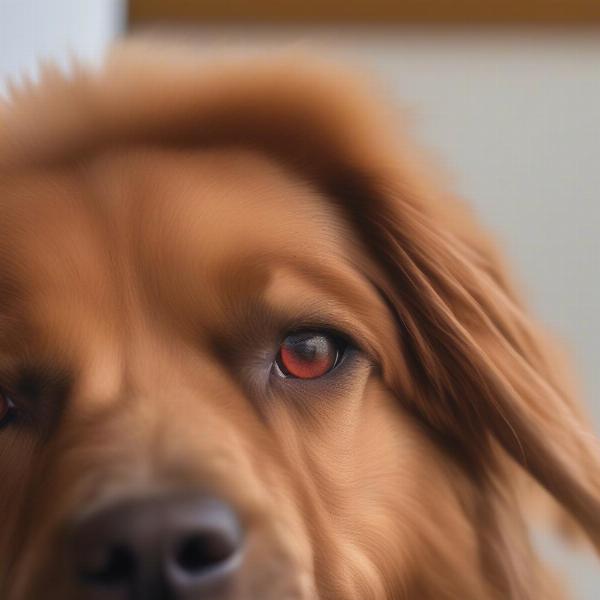Is your canine companion suddenly obsessed with spinning? Dog walking in circles can be a curious, and sometimes concerning, behavior. While an occasional twirl might be nothing to worry about, persistent circling can indicate an underlying issue. Understanding why your dog is walking in circles is crucial to addressing any potential medical or behavioral problems.
Decoding Canine Circling: Medical Reasons
Several medical conditions can cause a dog to walk in circles. Vestibular disease, for example, affects balance and can lead to disorientation, head tilting, and circling. Inner ear infections can also disrupt balance and cause similar symptoms.  Dog with an inner ear infection showing signs of dizziness and disorientation Neurological disorders, such as seizures or brain tumors, can also manifest as circling behavior. If your dog’s circling is sudden, accompanied by other symptoms like vomiting, loss of coordination, or changes in behavior, seek immediate veterinary attention.
Dog with an inner ear infection showing signs of dizziness and disorientation Neurological disorders, such as seizures or brain tumors, can also manifest as circling behavior. If your dog’s circling is sudden, accompanied by other symptoms like vomiting, loss of coordination, or changes in behavior, seek immediate veterinary attention.
Behavioral Reasons for Circling
Sometimes, circling isn’t a sign of illness, but rather a behavioral quirk. For example, some dogs circle before lying down, a behavior thought to be a throwback to their wild ancestors preparing a resting spot. Boredom or anxiety can also lead to repetitive behaviors like circling. If your dog isn’t getting enough physical or mental stimulation, they might engage in circling to release pent-up energy or soothe themselves. Compulsive disorders, similar to obsessive-compulsive disorder in humans, can also manifest as repetitive circling.
When to Worry and What to Do
While occasional circling might be normal, frequent or persistent circling warrants a vet visit. Observe your dog carefully. Is the circling accompanied by other symptoms? Does it seem distressed or disoriented? How often does it occur? Document these observations to share with your veterinarian. They can conduct a thorough examination to determine the underlying cause and recommend appropriate treatment.
Is it an Emergency?
If your dog’s circling is sudden, severe, or accompanied by other symptoms like seizures, collapse, or difficulty breathing, seek emergency veterinary care immediately.
Addressing the Root Cause
Treatment for circling depends on the underlying cause. If the cause is medical, your vet might prescribe medication or recommend other therapies. For behavioral circling, addressing the underlying anxiety or boredom is key. This can involve increasing exercise, providing mental enrichment through puzzles and training, and creating a calm and predictable environment. In some cases, behavioral modification techniques or medication might be necessary.
Conclusion
Dog walking in circles can be a puzzling behavior, but understanding the potential causes can help you address it effectively. Whether the cause is medical or behavioral, early intervention is key to ensuring your dog’s well-being. By working closely with your veterinarian and addressing the root cause, you can help your furry friend break free from the spin cycle and live a happier, healthier life.
FAQ
- Why does my dog walk in circles before lying down? This is often a normal, instinctual behavior related to preparing a resting spot.
- Is circling always a sign of a serious problem? No, occasional circling can be normal, but persistent circling should be investigated by a vet.
- What should I do if my dog suddenly starts circling? Observe for other symptoms and contact your veterinarian.
- Can anxiety cause a dog to walk in circles? Yes, anxiety and boredom can lead to repetitive behaviors like circling.
- How is circling treated? Treatment depends on the underlying cause and may involve medication, behavioral modification, or environmental changes.
- What are the signs of vestibular disease in dogs? Signs include head tilting, loss of balance, circling, and sometimes vomiting.
- Should I be concerned if my senior dog starts circling? Yes, circling in older dogs can be a sign of cognitive decline or other medical issues and should be evaluated by a vet.
ILM Dog is your global resource for expert dog care advice. We cover everything from breed selection and puppy care to senior dog health and training. Whether you’re a seasoned dog owner or just starting your journey, ILM Dog provides reliable, practical information to help you give your canine companion the best possible care. For expert advice tailored to your dog’s needs, contact us at [email protected] or call us at +44 20-3965-8624.